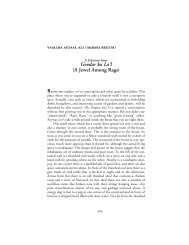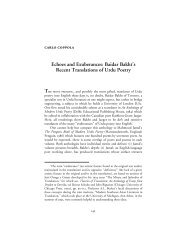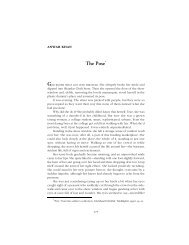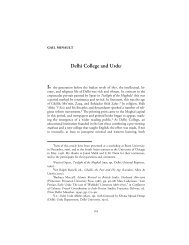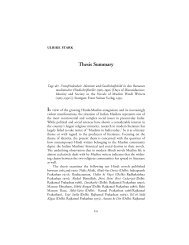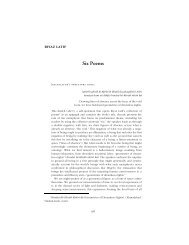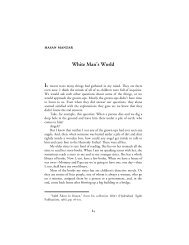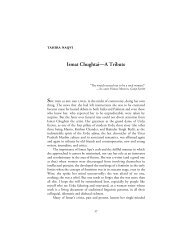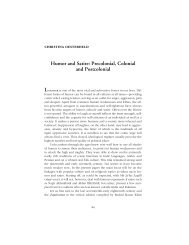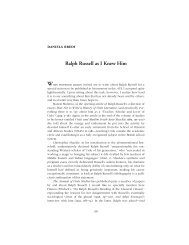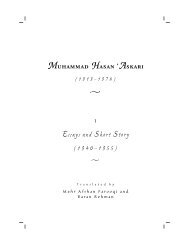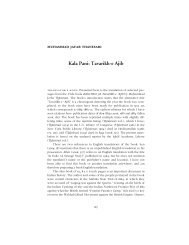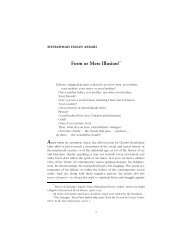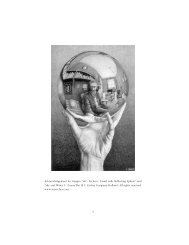Politics, Public Issues and the Promotion of Urdu Literature: Avadh ...
Politics, Public Issues and the Promotion of Urdu Literature: Avadh ...
Politics, Public Issues and the Promotion of Urdu Literature: Avadh ...
Create successful ePaper yourself
Turn your PDF publications into a flip-book with our unique Google optimized e-Paper software.
ULRIKE STARK • 81this cautious stance could border on a kind <strong>of</strong> opportunism which wassuspicious even to British eyes. As an <strong>of</strong>ficial report noted in 1881:Of <strong>the</strong> Oudh papers <strong>the</strong> best is <strong>the</strong> Oudh Akhbar. This paper is, however,somewhat timid in tone, <strong>and</strong> rarely ventures to advocate strongly anyimportant measures till satisfied that <strong>the</strong>y are likely to find favor withGovernment. Though a consistent <strong>and</strong> admiring supporter <strong>of</strong> LordLytton’s various measures, no sooner did it hear <strong>of</strong> his resignation than ithastened to advocate those changes in policy which seemed likely wouldtake place under <strong>the</strong> new Government. 39Following <strong>the</strong> formation <strong>of</strong> <strong>the</strong> Indian National Congress in 1885, AAbecame a prime target for <strong>the</strong> nationalist <strong>Urdu</strong> press, particularly once itsproprietor Naval Kishore had openly joined ranks with Sir Sayyid A√madKh≥n’s United Indian Patriotic Association <strong>and</strong> assumed a leading positionin <strong>the</strong> anti-Congress movement. 40 It is difficult to dissociate politicalopposition from pr<strong>of</strong>essional rivalry in <strong>the</strong> bitter attacks on AA that various<strong>Urdu</strong> journals started to indulge in at that time. The continuouslylarge share <strong>of</strong> government patronage that Naval Kishore’s firm <strong>and</strong>, withit, AA enjoyed was indeed prone to incite jealousy. The rival <strong>Urdu</strong> pressinvariably portrayed Naval Kishore as a sycophant <strong>of</strong> <strong>the</strong> colonial empirewho in opposing <strong>the</strong> Congress was motivated by self-interest <strong>and</strong> servilityalone. In <strong>the</strong> process, AA was declared unable to represent national interests.Avad^ Pan± defamed <strong>the</strong> paper as a money-minded “bani≥ akhb≥r,”39 Report on <strong>the</strong> Administration <strong>of</strong> <strong>the</strong> North-Western Provinces <strong>and</strong> Oudh, for<strong>the</strong> year ending 31 March 1881, p. 359.40 There is a persisting myth, perpetuated in much biographical writing onNaval Kishore, that <strong>the</strong> publisher was a fervent supporter <strong>of</strong> <strong>the</strong> Indian NationalCongress <strong>and</strong> <strong>the</strong> Lucknow delegate to <strong>the</strong> inaugural session <strong>of</strong> <strong>the</strong> Congress heldin Bombay in 1885. This could not be fur<strong>the</strong>r from <strong>the</strong> truth. The Lucknow delegatewas Munshi Gag≥ Pras≥d Varm≥ (b. 1863), <strong>the</strong> proprietor-editor <strong>of</strong> <strong>the</strong>rivaling <strong>Urdu</strong> journal Hindust≥nµ <strong>and</strong> an outspoken adversary <strong>of</strong> Naval Kishore in<strong>the</strong> arenas <strong>of</strong> local journalism <strong>and</strong> politics. The confrontation <strong>of</strong> <strong>the</strong> two men wasstaged around <strong>the</strong> 1892 Municipal Elections in which Naval Kishore acted aschief canvasser for <strong>the</strong> anti-Congress c<strong>and</strong>idate B≥b∑ Shrµ R≥m, whereas Gag≥Pras≥d Varm≥ supported <strong>the</strong> Congress c<strong>and</strong>idate Pan≈it Bµshan Nar≥yan Dar. In1893 <strong>the</strong> two men clashed again over <strong>the</strong> election <strong>of</strong> <strong>the</strong> Lucknow delegate to <strong>the</strong>Provincial Legislative Council. Details in An<strong>and</strong> Shankar Singh, Growth <strong>of</strong> PoliticalAwakening in Uttar Pradesh, 1858–1900 (Varanasi: Vishwavidyalaya Prakashan,1991), pp. 144–6.



